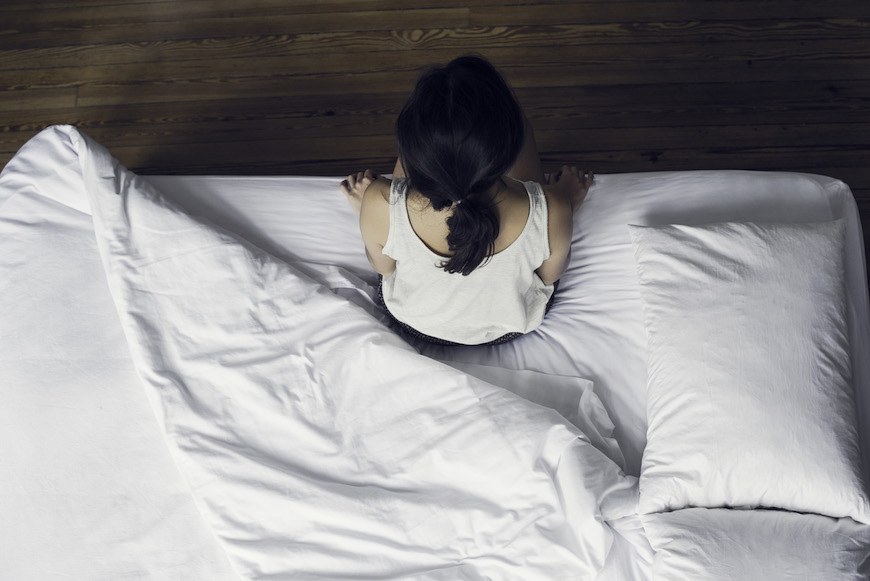Let’s Put This to Bed: Is Sleeping on the Floor Good for Your Back?
Yes, the internet is full of anecdotes from people who successfully traded their plush mattresses for unforgiving hardwood. Fans of the practice recommend it for several reasons—some say it gives them a more comfortable, supported night’s sleep, while others claim that the lack of a bulky bed frame and box spring creates more space and a cleaner home aesthetic. Some people even remark that they spend less time watching TV now that their sleep space is only comfortable enough to hang out in while unconscious. (Unexpected upside: It might give their sex lives a boost...)
Despite growing interest in floor sleeping, very little research has been conducted to investigate its benefits and drawbacks. One oft-cited anthropological analysis was conducted by physiotherapist Michael Tetley, who scrutinized the sleeping positions of people around the world. He observed that forest dwellers, nomads, and tribal people in several different cultures typically sleep on the floor, without pillows, and tend to suffer fewer musculoskeletal problems than their western bed-loving counterparts.
Tetley also noted that specific floor-based sleeping positions were used to treat different joints. For example, using an arm as a pillow was said to aid in shoulder, elbow, and wrist rehab. Though Tetley’s theories and photographs are fascinating, they have yet to be tested scientifically or compared across cultures and sleeping surfaces. For now, the evidence in favor of ground-level snoozing is mainly anecdotal.

{{post.sponsorText}}
So is sleeping on the floor really good for your back? Here's what the experts have to say.

Potential risks of sleeping on the floor
In order to learn more about the potential health benefits—and pitfalls—for those who decide to scrap the mattress in favor of a carpet, I spoke with chiropractor Amber Langmeier of All Chiropractic, LLC. She's not convinced that sleeping on the floor can reduce back pain in the long run. “Due to different spinal curves, lying flat on your back on the floor could lead to muscle spasms and difficulties getting up,” Langmeier argues.
This is extra problematic if you sleep on your side. “For individuals who are side-sleepers, it can be even more troubling to adequately support all the individual curves while lying on the floor,” Langmeier cautions. “Pressure points are also problematic in prolonged positions on harder surfaces.”
As floor-sleeping proponents are apt to point out, people in many cultures worldwide don't have access to feather beds or memory foam, yet they, presumably, catch plenty of zzz’s while resting on flat, hard surfaces. However, Langmeier provides a compelling counterargument. “Nowadays, we aren't sleeping on dirt floors, but hardwood, carpet, or tile. This does not form to your body like dirt floors once would have.” To put it simply, sleeping on the ground doesn’t mean the same thing today as it meant hundreds of years ago, when people had a softer surface to land on.
Benefits of ditching your bed
Does this mean you should reject outright the possibility of sleeping safely and soundly on the ground? Clearly, there is a subset of people who perceive that the quality of life benefits associated with floor sleeping outweigh the consequences.
Langmeier admits that everyone's anatomy is different, and for certain people, it could actually work. “The support structure and amount vary for each individual spine and person. One needs to take into consideration their body's comfort, conformation, and structure.”
Dr. Jeffrey Golden, a spinal surgeon at NYU Langone Medical Center, concurs with Langmeier’s point. “Sleep’s very personal,” he stated in an interview with Quartz. Golden confirmes that from the perspective of preserving spine health, evenly distributed support is key. (Score one for the floor.) He also reiterates that there is no research to suggest that mattresses are healthier than Japanese-style tatami mats or other alternative sleep surfaces.
Back surgeons working at The Spine Institute in Santa Monica, California offer an additional counterpoint, suggesting that sleeping on the floor might actually be favorable for people suffering from chronic back pain. Though their claims do not appear to be backed by research, they write that sleeping on a perfectly flat surface, like the floor, benefits the small stabilizer muscles that support body weight. They also suggest that sleeping on the floor helps keep the spine in a neutral position with an even application of pressure, minimizes cushioning that may impede natural sleep movements, and provides a more restful night of sleep, which promotes tissue repair and allows for healing.
So where do we land with all of this intel? If you decide to experiment with how you personally can get a better night’s sleep, consider the factors that hurt or help you. Perhaps there are dips in your mattress that can lead to aches, pains, and stiffness. Evaluate the height of your pillow, which impacts the angle of your neck and alignment of your joints. Maybe you'll even decide to test out floor sleeping for a night or two to see how it works for you. Either way, you're primed to be more cognizant of subtle adjustments you can make in order to improve the quality of your sleep—no matter what surface you're snoozing on.
Find out what your sleep position says about your personality, and then adopt this ultimate bedtime routine for a more energized a.m.
Loading More Posts...